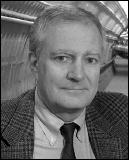Marburger is a
graduate of Princeton and received his Ph.D.
in Applied Physics from Stanford in 1967.
He is currently Director of the
U.S. Department of Energy’s Brookhaven National Laboratory. Be- fore joining Brookhaven, he served as President of the State University of New York at Stony Brook from 1980 to 1994. Marburger also served as Chair- man of the Physics Department at the University of Southern California. It had been rumored that previ- ous candidates were told that
the Science Advisor would not have
an active role in Bush
Administration policy development, but Marburger’s planned
role and authority have not been made
public. n n Conservative Senate Surgeon Backs Stem Cells Amid
Congressional hearings and dueling press
conferences on stem cells, all talk came to
a halt on the morning of July 18 as Sen. Bill Frist (R-TN) first rose to speak in the Senate
chamber and later before a packed hearing
of the Senate Appropriations Subcommittee
on Labor, Health and Human Services and
Edu- cation. He announced his support for
embry- onic stem cell
research. Frist, a heart and lung
transplant sur- geon before entering
politics, is highly re- garded in the
Senate, particularly on matters of science
and medicine. Both Democratic and
Republican Senators of- ten defer to the
judgement of “The Doc- tor” on these
issues. In addition, Sen. Frist serves as the Chairman of the important Republican Senatorial Campaign Com- mittee, the organization charged by the Republican Party with electing Republi- cans to the Senate, providing him additional
influence with the President as he wrestles
with his own decision on stem cell
research. Sen. Frist has outlined a
ten-point proposal on human stem cell
research: 1. ban embryo
creation for research 2. continue the funding ban on
derivation of embryos for
research 3. place a ban on
all human cloning 4. increase funding for adult stem cell
re- search 5. allow only the use
of blastocysts that would
otherwise be discarded 6. require a rigorous informed consent
pro- cess 7. allow a limited, yet still
undetermined, number of stem cell
lines 8. establish a
strong public research over- sight
system 9. establish an
ongoing scientific review of stem cell
research, and 10. strengthen fetal
tissue research. The Senate hearing where
Sen. Frist testi- fied also included the
release of a report by the National
Institutes of Health that details the
merits of research into both adult and embryonic stem cells and advocates for both types of work. The report is at
www.nih.gov/ news/stemcell/scireport.htm.
n n ASCB
Responds to
Biomedical Research Amendment During Senate
floor debate on the Bipartisan Patient
Protection Act, commonly referred to as
the Patient’s Bill of Rights, Sen.
Sam Brownback (R-KS) introduced an
amendment to prohibit human germline gene
modifica- tion. Unfortunately, the
amendment would have effectively outlawed
basic biomedical research. Sen.
Edward Kennedy (D-MA), sponsor of the
Patient’s Bill of Rights, con- tacted
the ASCB to appeal to Brownback to withold
the amendment. Members of the ASCB
Public Policy Committee from states with
key Republican Senators contacted their Senators to urge them to not support Sen. Brownback and his amendment. The Senate
debated the amendment late on the evening
of June 28. The next morning, just as the
Sen- 14 Continue
The ASCB Newsletter, Vol
24, No 8 John H.
Marburger Sen. Bill Frist (R-TN) 

